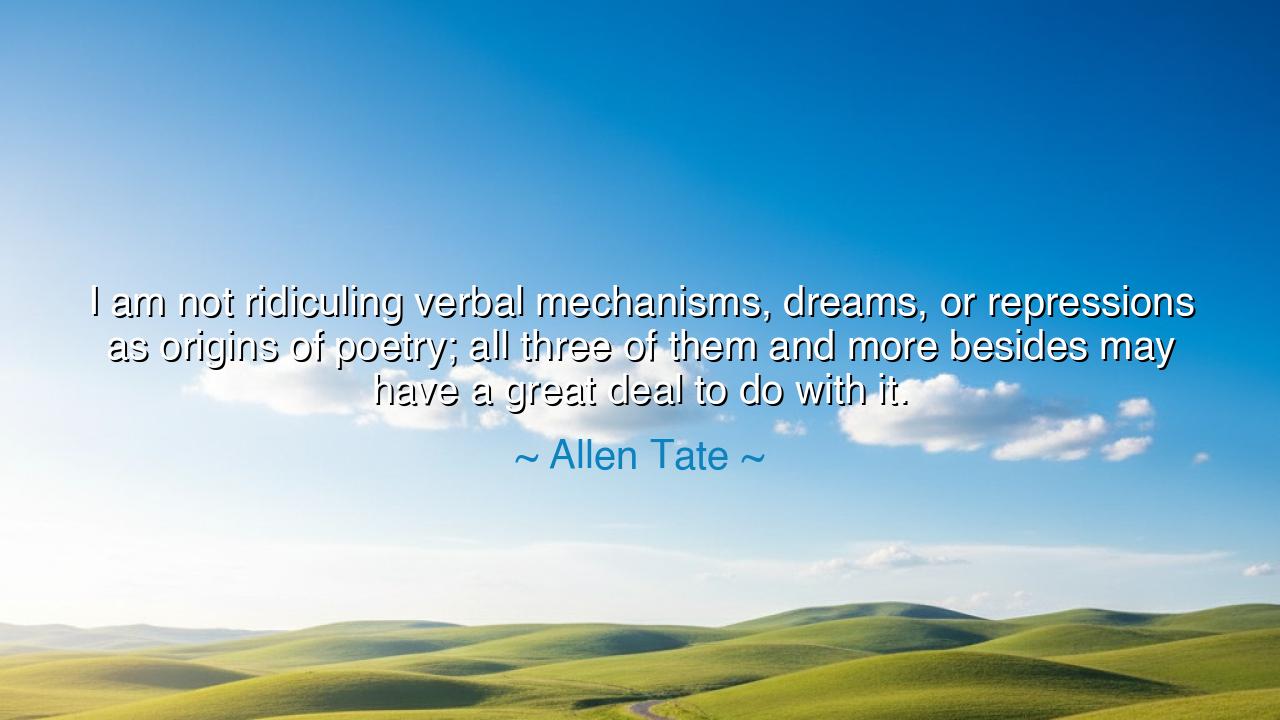
I am not ridiculing verbal mechanisms, dreams, or repressions as
I am not ridiculing verbal mechanisms, dreams, or repressions as origins of poetry; all three of them and more besides may have a great deal to do with it.






“I am not ridiculing verbal mechanisms, dreams, or repressions as origins of poetry; all three of them and more besides may have a great deal to do with it.” Thus spoke Allen Tate, the poet and critic who sought to understand not merely how words are written, but how they are born. His statement is not a rejection of reason, nor a surrender to mystery, but a wise reconciliation of both—the recognition that poetry arises from the meeting of the conscious and the unconscious, the disciplined and the divine. Tate reminds us that the origins of poetry are manifold: the flicker of a dream, the wound of a memory, the rhythm of language itself. Each contributes to the sacred art of transforming experience into meaning.
To understand Tate’s words, one must first grasp the spirit of his age. He wrote during a time when science and psychology sought to explain the inner workings of the human soul. The Freudians spoke of repression, the hidden emotions buried beneath reason; the surrealists worshiped dreams, those nightly visions where logic dissolves and the strange becomes sublime. Linguists spoke of verbal mechanisms, of sound and symbol forming patterns beyond intention. Tate, the scholar-poet, did not mock these theories—he embraced their mystery—yet he also saw that no single force could explain the birth of poetry. It is not the child of one cause, but the offspring of the entire human spirit.
In this sense, Tate’s insight echoes the wisdom of the ancients. The Greeks spoke of the Muses, divine daughters of memory and creation, who inspired poets to speak truths they themselves could not fully comprehend. The poets did not claim ownership of their art—they were vessels, mediums through which emotion and intellect, dream and destiny, converged. In the same way, Tate honors both the unconscious impulse and the conscious craft. He knows that poetry is not made—it is revealed, and that the poet, though skilled, is also humbled before the mystery of creation.
Consider the life of William Blake, the visionary artist who saw angels in the trees and eternity in a grain of sand. His poetry came not from method alone, nor from madness alone, but from the fusion of dream and reason, of divine vision and disciplined hand. Blake’s “Songs of Innocence and Experience” are not random imaginings; they are structured revelations. He, like Tate, understood that art is the harmony between chaos and control, between the unconscious river that flows through the soul and the conscious hand that shapes it into song.
Tate’s humility in this quote is itself a teaching. He admits that he does not fully know from where poetry springs—and therein lies his wisdom. The truly wise do not mock the unknown; they stand in awe of it. He reminds us that creativity cannot be caged by theory, for it arises from too many sources—the heart, the dream, the word, the pain. To reduce poetry to a single explanation would be to strip it of its divinity. For poetry is life itself speaking back to us—through laughter, sorrow, longing, and the vast, unmeasured silence between words.
In our own time, we are tempted to dissect creation—to measure the brain, to map emotion, to explain away mystery. Yet Tate’s voice calls from the past: do not forget the unseen origins of beauty. Whether one writes poems, paints pictures, or lives a simple life with care and imagination, creation is always an act of partnership between the known and the unknown. To dream is not weakness, and to reason is not pride—both are instruments of the same divine orchestra.
So, children of thought and feeling, take this lesson from Allen Tate: honor all the sources of your inspiration. Do not scorn the irrational, for dreams often carry truths reason has forgotten. Do not dismiss craft, for without it the dream cannot endure. Cultivate both the soil and the storm within you, and let them meet in the flowering of creation. When next you write, or build, or love, remember this: your work is born not from one root, but from the whole of your being. Dream deeply, think clearly, and create bravely—for that is the true origin of poetry, and of all great things.






AAdministratorAdministrator
Welcome, honored guests. Please leave a comment, we will respond soon